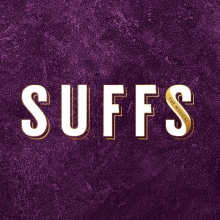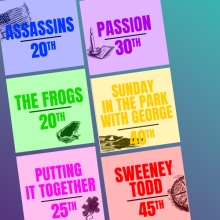
Full Synopsis
Act One
Franklin Shepard sits at a piano in a tuxedo. He is an accomplished pianist. As he stares into the distance, the company enters, and a slide show plays that tells the story about to unfold: that of Frank and his friends, Charley Kringas and Mary Flynn. The slide shows ends with an invitation to a party at Frank's house in Bel Air, California, celebrating the new Hollywood movie that he produced. The company reflects Frank's mindset ("Merrily We Roll Along").
We segue to the party where the most influential – and vapid – people in Hollywood praise Frank's success as a producer ("That Frank"). Meanwhile, Mary sits alone at the bar, obviously drunk. She is not in good shape; occasionally other guests approach her, but she summarily dismisses them with wry comments. Frank tries to appease Mary's obvious disappointment with him for selling out, while also encouraging his guests to have fun. Mary admonishes Frank for his estrangement from his son Frank, Jr. When a guest accidentally mentions Charley's Pulitzer Prize-winning play, the party freezes. Charley is not to be mentioned in Frank's presence. Over the course of the party, we learn that Frank is cheating on his wife, Gussie, with the young star of his movie. Eventually, Mary blows up at Frank in front of everyone and storms out – she is finally out of his life, and the loss is unbearable. Gussie confronts Meg and Frank, and throws iodine in Meg's eyes. As everything falls apart around Frank, the company takes us back three years in time ("Transition 1").
An NBC Television Studio in New York City. Backstage during a news broadcast, we meet Charley, Frank's collaborator. Charley blames Mary for talking him into coming on this news program; Frank no longer seems interested in writing the musical upon which they were working, because Frank is too focused on his money and Hollywood projects. Mary assures Charley that if he does this interview, Frank will come back to their creative partnership, reminding him that their friendship is the cornerstone of all of their lives. He is convinced ("Old Friends – Like It Was"). Charley realizes that Mary is still in love with Frank, as she has been for the past twenty years.
Just before the interview, Charley discovers that Frank has signed a three-picture deal, meaning that work on their show will be postponed. Charley is furious. As they argue, Frank reminds his collaborator that he has a son to support and an ex-wife to whom he must pay alimony. Suddenly, in the midst of their argument, they are on the air. The interviewer asks how they work together, and Charley bitterly answers by saying that Frank's business always gets in the way of their work ("Franklin Shepard, Inc."). Frank is furious and hurt that Charley has humiliated him on national television. Frank tells Charley that he is dead to him. The two men actually come to blows as Mary attempts to intervene. Each goes his separate way, and the company takes us back to 1968.
We are now in a luxurious New York apartment. Frank is on the phone as his nine-year old son, who has just arrived from Houston, runs in, followed by Mary and Charley. Frank has just returned from an extended vacation traveling first-class on an ocean liner. As they welcome him back, Frank gives Charley a present – the option agreement to turn their successful movie into a film. Charley is less than thrilled. He wants them to work on their passion projects. Frank wants to cash in on the Hollywood deal to adapt their musical to the screen. He needs the money to support his son, to maintain his life style, and to afford the payments on the alimony to his wife, Beth. Mary attempts to stop their argument by reminding them of the strength of their friendship ("Old Friends").
Gussie enters with her now-husband, Joe, the producer of their hit musical. Gussie is the star. For a few moments, Frank and Gussie are left alone; it is revealed that they are in love. She announces that she is going to leave Joe. Soon, the others are back with glasses and a champagne bottle. Joe realizes that Frank and Gussie are in love. She must hurry off to the theatre to make the curtain. Once Joe and Gussie leave, Charley levels with Frank, advising him to get rid of Gussie and pleading with him to give up this phony life to get back to writing a new show together. Frank promises to meet Charley and Mary later at their favorite pub, despite the fact that Gussie has asked him to stay home and wait for her call.
Alone at the piano, Frank goes back and forth about what Charley has said to him ("Growing Up – Part 1"). Gussie reappears, saying that she's left Joe for good and that she and Frank belong together; she tells him that growing up is taking what you want ("Growing Up – Part 2"). Frank is at first reluctant and asks her not to discard her marriage so casually, but she persists... and he gives in.
The company transitions us to a year earlier on the steps of a courthouse ("Transition 3"). Frank's wife, Beth, is divorcing him in a messy, publicized trial. His friends urge him to get away, get some rest and take a cruise. Beth enters, and Frank tries to reason with her, but when he admits that he slept with Gussie, she tells him that it's over, no matter how much she may still love him ("Not a Day Goes By"). Mary leads Frank's friends in telling him to put this all behind him; hopefully, hard times help you grow ("Now You Know"). Frank sees this logic and begins to revive and feel hopeful.
Act Two
Gussie strides back and forth across the empty stage. She analyzes the fact that she always falls for the wrong men. It becomes clear that she's singing in Frank and Charley's Broadway show ("Act 2 – Opening").
The scene shifts to the stage door while the group waits outside. Beth urges Frank to do another show for Joe, for the money, while Mary encourages him to work on his own projects. Beth thinks this is easy for Mary to say since she just wrote a best-selling book. Suddenly, the group hears tremendous applause from inside the theatre. Joe joins them to confirm that it's a hit ("It's a Hit"). Charley's wife, Evelyn, is suddenly taken with labor pains and rushes to the hospital. After the show ends, Beth and Charley leave to join Evelyn. Frank is left alone with Joe and Gussie to celebrate. Mary encourages Beth to stay with Frank, but she says that she wouldn't want a man whom she can't trust.
The company takes us back to1962 ("Transition 4"). In Gussie and Joe's brownstone on Sutton Place, a huge party is taking place. Frank and Beth are guests. Beth bubbles over pointing out celebrities and politicos. Her gushing embarrasses Frank. Charley arrives. Gussie introduces them to her friends, the New York elite, whom she mocks for their group mindset ("The Blob"). Gussie gets rid of Beth by spilling wine on her dress and then offering her a dress from Gussie's own closet. Joe and Gussie offer Frank the opportunity to write the score for her next show, but he is disappointed, as he and Charley had hoped Joe wanted to produce their show. Gussie reminds him that growing up is making hard choices and urges him to do it, saying that it will make his career ("Growing Up").
Gussie announces that Charley and Frank will perform for the crowd. Charley is uneasy but as he sings, he gets encouraging glances from Beth and Mary because the song is going over well ("A Good Thing Going"). Enthusiastic applause erupts on the last note. Gussie urges them to do the song again. Charley is against it, Frank insists on a repeat and begins the number again. Their audience is distracted, no longer interested; they return to their gossip. Charley storms out, and the other guests hardly notice as Frank, Mary and Beth follow.
The company takes us back to 1960 at the Downtown Club ("Transition 5"). Beth, Charley and Frank are performing their Greenwich Village nightclub act, a satirical name-dropping spoof of the Kennedy clan to an Irish jig ("Bobby and Jackie and Jack"). Gussie and Joe are in the audience. Frank introduces himself. Gussie, already a Broadway star, is going through a divorce from her second husband. Frank and Beth are soon to be married. Charley joins the table. Beth confesses to Frank that she is not pregnant, but he says that he still wants to marry her. She then announces that she actually is, but just wanted to make sure that he really wanted to marry her. Beth's parents offer Frank $2,000 to call off the wedding, but the couple refuses. Beth's mother offers her daughter the ring that had been her grandmother's. The parents embrace their daughter, and the ceremony begins. Beth professes her love for Frank in front of everyone while Mary sits at a cocktail table with her own thoughts and unrequited love ("Not a Day Goes By – Act 2").
The company leads us to 1959 ("Transition 6"). Frank is at the piano. Charley is at a typewriter. A light comes up on Mary on the telephone with Frank. We see them all working in their separate spaces. They are trying to make it at their respective crafts: Mary writing a novel, Charley his plays and Frank his music ("Opening Doors").
The stage develops into various scenes: an interview at an agent's office, a rehearsal hall, a subway station. Mary moves from one magazine job to another. Soon, Frank and Charley are auditioning for Joe, who complains that their music isn't hummable enough. The team pools resources and decides to write a cabaret revue to showcase their own work. They audition Beth and hire her. Beth, Frank, Charley, Mary and Beth's mother transition us back in time for one last moment ("Transition 7").
Finally, we are on the rooftop of a tenement on 110th Street in 1957. Frank excitedly tells Charley that he wants to turn his play into a musical; he believes that they can create something very meaningful together ("Our Time – Part 1"). Mary enters the roof and introduces herself, then promptly leaves. Charley asks Frank if he wants go get married, and they agree that's a long way off ("Our Time – Part 2"). When Mary returns, she compliments Frank on his piano music. Mary's roommate, Evelyn, pops up for a minute but runs away when she sees the boys. Charley and Mary search the sky with binoculars, suddenly spotting Sputnik, the Russian satellite, darting overhead. In this moment, the three new friends believe that anything and everything is possible for them.
The company files on to witness the birth of a new era as the three friends solidify their budding friendship ("Our Time – Part 3").
Show History
Inspiration
Judy Prince, wife of the original director, Harold Prince, had been "nagging" him to do a musical about teenagers, when he recalled Merrily We Roll Along, the 1934 play by George S. Kaufman and Moss Hart, upon which the now likewise-titled musical is based.
The musical's writers retained the basic structure and overall theme of the play but updated it to encompass the period from 1957 to 1976. Sondheim said that, since the play was about friendships, he wrote the songs to be interconnected.
The story revolves around Franklin Shepard who, having once been a talented composer of Broadway musicals, has now abandoned his friends and his songwriting career to become a producer of Hollywood flicks. Like the play, the musical begins at the height of his Hollywood fame and moves backwards in time, showing snapshots of the most important moments in Frank's life that shaped the man that he is today. The musical utilizes a chorus that sings reprises of the title song to transition the scenes.
Productions
Merrily We Roll Along, based on the 1934 play of the same name by George S. Kaufman and Moss Hart, is a musical with a book by George Furth and lyrics and music by Stephen Sondheim. Directed by Harold Prince, with choreography by Larry Fuller, the show began previews on Broadway at the Alvin Theatre on October 8, 1981, before officially opening on November 16, 1981. The musical ran for 44 previews and 16 performances.
In 1985, Sondheim's new collaborator, James Lapine, mounted a revised version at the La Jolla playhouse in California, and Furth and Sondheim were again inspired to make the show work. This was followed by a mounting at Arena Stage in Washington, D.C., directed by Douglas C. Wagner, which further affirmed the show's great potential. More productions – including one at Harvard University, personally overseen by Furth – continued to fine-tune the script.
Then in 1994, Merrily We Roll Along was revived Off-Broadway by The York Theatre Company, with Sondheim and Furth. The production, directed by Susan H. Schulman, was such a smash that it sold out and had to be extended. This streamlined version is the one licensed by MTI.
The show finally received its West End premiere at London's Donmar Warehouse on December 11, 2000, in a production directed by Michael Grandage. It was seen again in the West End, when Maria Friedman directed a revival of the musical at London's Menier Chocolate Factory, which opened on November 28, 2012, and transferred to the Harold Pinter Theatre in the West End on May 1, 2013.
Critical Reaction
"Glorious.... Heartbreaking.... The charms of the music are still abundantly evident.... The cheers began with the first bars of the show s overture, the most infectious and conventionally stirring that Mr. Sondheim wrote."
– New York Times
"The songs, and the mood and verve and expertise... in all these aspects, Merrily sings."
– TIME Magazine
"A 'merry' experience - hugely witty, tunefully inventive and brightly entertaining& has the freshness of real-time thought and the sting of genuine feeling."
– The Telegraph
"The songs are rich in melody... the lyrics are deftly sophisticated and witty, and there is brilliant use of musical themes."
– Talkin' Broadway
Tony® Award
Theatre World Award
Drama Desk Award
Outer Critics Circle Award
Olivier Award
Connect
Lucille Lortel Archives (Off-Broadway Premiere)
“Merrily We Roll Along Through the Years” article by Jack Viertal
Billing
- Book by
- Music and Lyrics by
Based on the original play by George S. Kaufman and Moss Hart
Requirements
|
Music and Lyrics by
STEPHEN SONDHEIM
|
Book by
GEORGE FURTH
|
Video Warning
In accordance with the Performance License, you MUST include the following warning in all programs and in a pre-show announcement:ANY VIDEO AND/OR AUDIO RECORDING OF THIS PRODUCTION IS STRICTLY PROHIBITED.
Included Materials
| Item | Quantity Included |
|---|---|
| ERRATA LIST | 1 |
| LIBRETTO/VOCAL BOOK | 25 |
| MEDIA CUE SHEET | 1 |
| PIANO CONDUCTOR'S SCORE ACT 1 | 2 |
| PIANO CONDUCTOR'S SCORE ACT 2 | 2 |
Production Resources
| Resource |
|---|
| FULL SCORE VOL. 1 OF 4 |
| FULL SCORE VOL. 2 OF 4 |
| FULL SCORE VOL. 3 OF 4 |
| FULL SCORE VOL. 4 OF 4 |
| HOW DOES THE SHOW GO ON-10/CS |
| HOW DOES THE SHOW GO ON? |
| PRODUCTIONPRO-DIGITAL SCRIPT/SCORE |
| REFERENCE RECORDING |
| STAGE WRITE APPLICATION |
| TRANSPOSITIONS-ON-DEMAND |
STANDARD ORCHESTRATION
| Instrumentation | Doubling |
|---|---|
| BASS | |
| DRUMS | BELLS , BONGO , GOURD , RACHET , SCRAPER , TAMBOURINE , TEMPLE BLOCKS , TRIANGLE , TYMPANI , VIBRAPHONE , WOOD BLOCK , XYLOPHONE |
| KEYBOARD 1 | |
| PIANO | |
| PIANO 2 | |
| REED 1 | ALTO SAXOPHONE , FLUTE , PICCOLO |
| REED 2 | ALTO SAXOPHONE , CLARINET , FLUTE |
| REED 3 | CLARINET , ENGLISH HORN , OBOE , TENOR SAXOPHONE |
| REED 4 | BARITONE SAXOPHONE , BASS CLARINET , BASSOON , CLARINET |
| TROMBONE | |
| TRUMPET | |
| TRUMPET 2 | |
| TRUMPET 3 |




